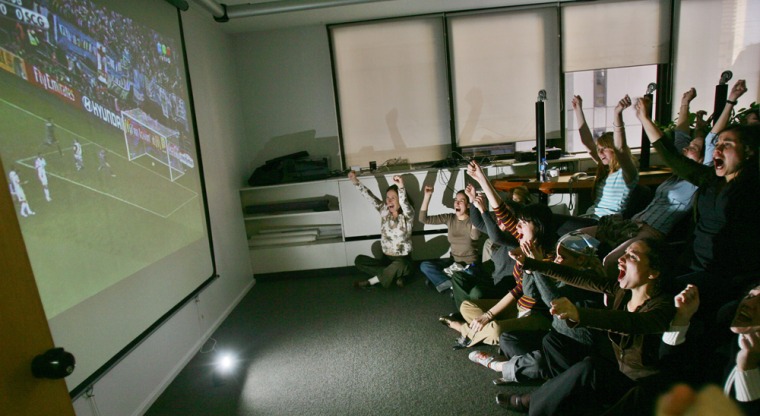English soccer fans looking for an excuse to skip work for the World Cup game against Trinidad and Tobago got a helping hand when a trade union published a guide full of advice on how to beat the boss in order to pull a "sickie." Local businesses were not amused, swiftly condemning its release and calling for the union to withdraw the guide.
But while conventional wisdom suggests the World Cup is a drain on worker productivity worldwide, some say it’s just the opposite — employee morale and commitment rise, and the entire office benefits from what Graham Spencer, European marketing director for global professional services firm Towers Perrin in London, calls "the feel-good factor" when your national team wins.
Estimates abound for the projected cost of lost productivity caused by employees taking a break from work to keep up with the action. The Center for Economics and Business Research in London pegs the number at $4.8 billion worldwide, with the greatest losses in Europe at $2.8 billion and South America at $1.62 billion. Losses in the rest of the world are estimated to be marginal, ranging from $18.5 million in Africa to $120 million in North America.
But Spencer puts little stock in figures that suggest the World Cup pulls down productivity. "We're in an era of flexible working," he says. "Workers know that if they want to take a little bit of time off or want to go early to watch a game, they will make up that time elsewhere."
Instead, he sees only upside as soccer fans revel in the latest action from Germany. At Towers Perrin, the firm is using the World Cup as an opportunity to invite clients to watch the games at its offices — Spencer says this can only be good for business. And the firm is making sure the office is set up so that employees can take a break and watch the games at work.
"The further teams go in the competition, the greater the feel-good factor is, and should England win it ... at that point you see a rise in employee overall commitment and in overall morale. People just feel good about it," says Spencer.
Industrial psychologist and University of North Carolina at Charlotte professor Steven Rogelberg believes that while distractions such as the World Cup are bound to have an impact on productivity, managers can mitigate their effects by adopting a time-flexible, goal-oriented approach with employees.
This year, there are more ways than ever to catch the games at work. From lounges to lobbies, televisions throughout the workplace are being tuned to the World Cup. The competition’s official Web site fifaworldcup.com, hosted by Yahoo, is offering two-minute highlight videos on-demand of all games for free, as well as up-to-the minute match scores and statistics.
The site is averaging 5 million unique visitors per day, and provided 31 million streams of game highlights during the first week of the tournament to users around the globe. Meanwhile, people on the move can get text messages with game scores sent to their mobile phones. And for the first time, some European mobile carriers are offering game highlights to users with 3-G compatible cell phones.
The British Broadcasting Corporation made waves when it announced June 1 that it would stream World Cup games online for free to UK broadband subscribers. Its Web site has been a big hit — nearly 1.3 million flocked to the "Beeb" during the first week of World Cup competition, according to Internet research firm Nielsen/NetRatings.
In America, English-language rights-holder ESPN is streaming 52 of 64 World Cup matches online at ESPN360.com, but only to subscribers of select cable providers with which it has license agreements. ESPN's Katherine Brett estimates it is currently available in 8 million homes, but points out that the Web site will be available to everyone with a broadband connection for a limited "all-access" period between June 26 and July 19.
Brett added that ESPN is well aware of the fact that most people using the service are accessing it from work. "We hope they can multitask," she says.
The trick, says John Challenger of Chicago-based global employment consulting firm Challenger, Gray & Christmas, is keeping workers focused by channeling World Cup fever through parties and office pools.
"It's hard to bridge cultures, and good companies that have multi-cultural and national workforces look for ways to break down those barriers to build connection and morale and community," says Challenger. "Here's an ideal way to do that."
Challenger points out that employers in the United States have little to worry about until the audience in America reaches a critical mass. Until then, other sporting events loom a bit larger. His firm estimated a total loss in productivity at $3.8 billion during this year's NCAA men's basketball tournament and $780 million for the Super Bowl, making the World Cup's estimated $120 million small peanuts.
Those figures are based on an estimated audience of 2 million people in America for the 2002 World Cup. But early returns from this year's edition indicate that interest is on the rise — 2.4 million Americans watched Team USA’s inaugural game against the Czech Republic on the Walt Disney Co.'s ESPN2 channel.
To be sure, losses in productivity as a result of the World Cup are more than offset by increased spending everywhere but South America, according to the CEBR study. And in Europe and Asia, favorable evening kickoffs for some games make it easier for fans to get in a day's work and arrive home in time.
But invariably there are some who simply cannot handle work and World Cup mania at the same time. "If you've got sports junkies, World Cup fanatics who can't get any of their work done, you might sit down with them individually and work out some kind of plan to help manage their time better," suggests Challenger.
